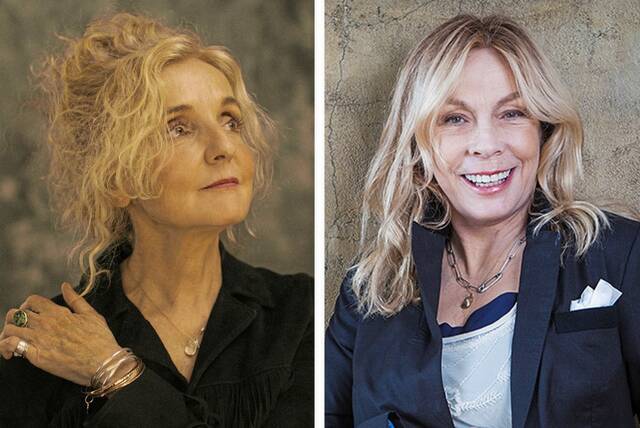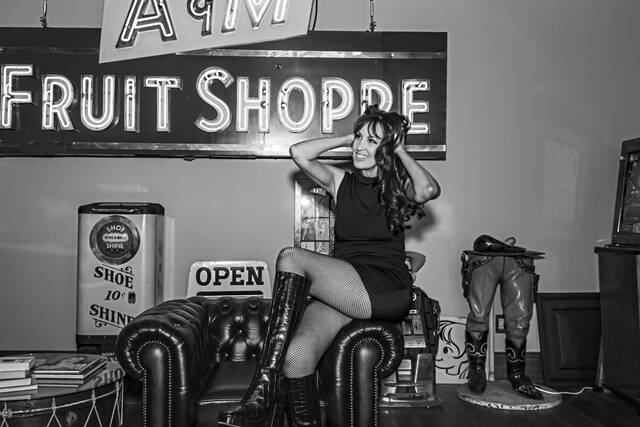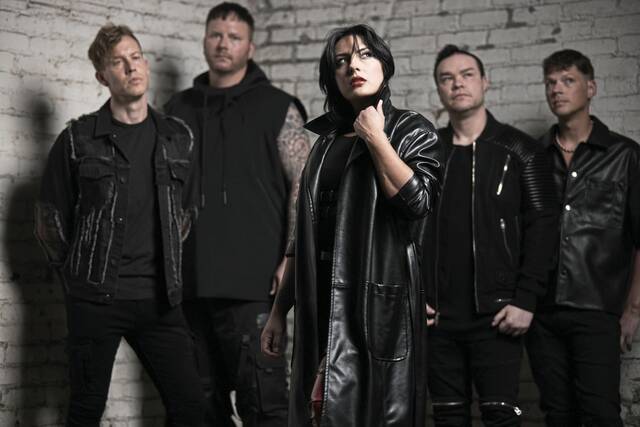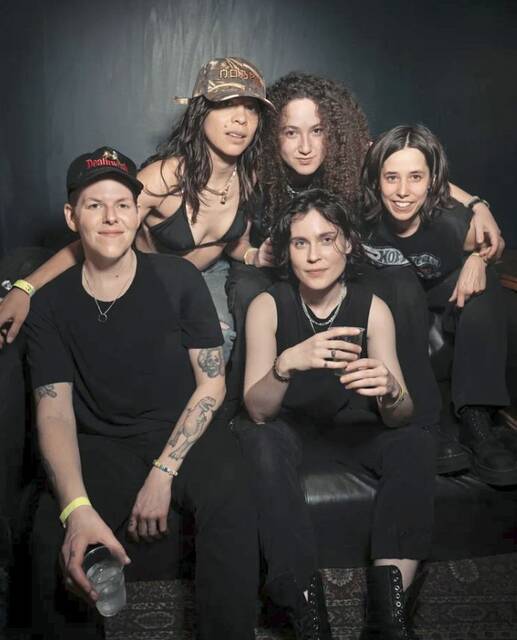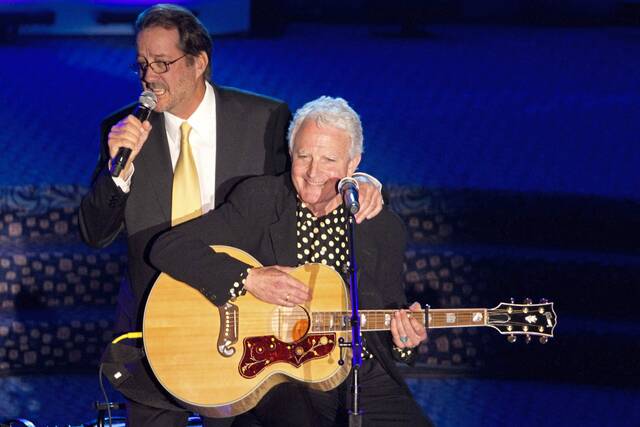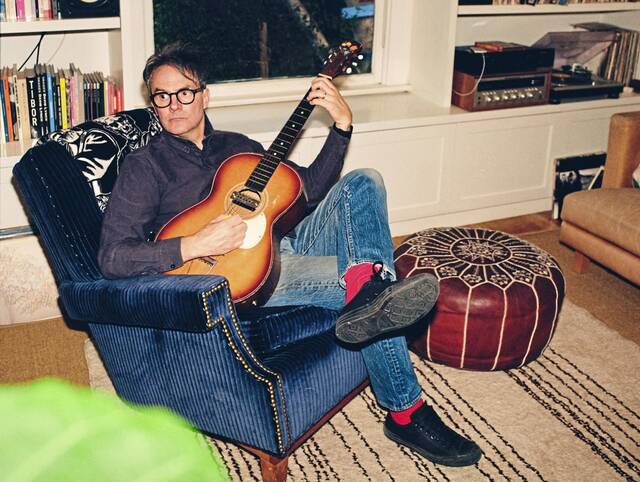Patty Griffin and Rickie Lee Jones may have only met for the first time earlier this year, but that hasn’t stopped the emotive, Grammy-winning singer-songwriters from forging a quick bond.
Griffin, the soulful folk/Americana artist, and Jones, who burst onto the scene with “Chuck E’s in Love” in 1980, are co-headlining a tour that will visit Pittsburgh’s Carnegie Music Hall of Oakland on Oct. 23.
“Well, for me, I don’t think Rickie Lee knew me from a hole in the wall probably when we met, but I’ve known Rickie Lee’s music since her first record, and I call her my North Star,” Griffin said. “Some people have their artists that they suddenly go, oh, wow, and they see the possibilities. And that’s this one for me.”
In July, Griffin released her latest album, “Crown of Roses,” which comes to terms with a complicated relationship with her late mother, while also rediscovering her voice after cancer treatment. Jones, who earned the nickname “The Duchess of Coolsville,” released “Pieces of Treasure” in 2023, covering 10 songs from the Great American Songbook.
The tour, which kicked off Oct. 10 in Mississippi, ends Nov. 1 in Dallas.
In a Zoom conversation before the tour, Jones (in New Orleans) and Griffin (in Austin, Texas) finished sentences and shared laughs while speaking with TribLive about why they’re touring together, progress in the music industry, their changing perspectives and more. Find a transcript of the conversation, edited for clarity and length, below.
What did you see in each other’s music that made you want to tour together?
Jones: Well, a tour isn’t, “I love your music.” A tour is, “People will buy the ticket.”
Griffin: (laughs)
Jones: They like the idea of Patty and Rickie. And so in my case, I’ve met a wall that I can’t seem to get by. I felt that with the right pairing, together we could do better business and introduce my audience to Patty, who probably already know her, and introduce me to Patty’s, who probably don’t already know me, because there’s some kind of a dark cloud between me and everybody else. (laughs) So it seemed like also from my view that Patty’s audience would be receptive to my work, maybe, if I’m careful about what I do.
Do you have to be on your best behavior?
Jones: My best lyrical behavior.
Griffin: Best lyrical behavior.
You said you had to be on your best behavior lyrically, but you can be on your worst behavior, I guess, besides that?
Jones: I don’t think you can ever be on your worst behavior anymore. It’s a very troubled country, and you got to come out with your best foot forward. There’s no room to be all about me and how I feel and I’m so upset and angry, which is the hubris of youth. But I think it’s just we can’t do it anymore.
So you have to be a little bit more careful about what you say, is that what you mean?
Jones: I mean that you got to bring love and hope and kindness every time you step on the stage.
Griffin: Yes.
Jones: You have to be aware of it. Sometimes in some years or some epochs, it’s all about the story I’m writing or the song I’m singing, but I’m terribly aware of the state of people’s lives now. So when I step on stage, I really want to make sure that I don’t harm anybody. So that’s when I’m out there, I’m smiling, bringing it to them.
Griffin: Yeah, and it’s fun.
Jones: It is fun.
Griffin: To be able to do that.
Patty, in light of the new documentary on the Lilith Fair — which you played here in 1997 — what was the atmosphere in the music industry like then, and how important was that tour?
Griffin: It was a weird thing for me because, at the time, I felt threatened by being separated out from the boys. I felt like, well, God, I didn’t really get why that was necessary. I do now (laughs) but I thought I can compete with these boys and why do I need to go have my own festival? I didn’t understand any of that, and now I totally understand that, and I’m grateful that they did it. Some things have got better, some things have not gotten better. It’s just a work in progress still. That’s the whole thing.
Rickie Lee, have you seen a ton more progress too since you first started?
Jones: Well, I started a century ago, so let’s hope so. What are you asking really? Are you asking something you really want to know?
Do you feel like women are more accepted in the music industry compared to whenever you first started?
Jones: To be honest, I can only tell you my experience. I don’t know what Beyonce or even people who’ve been around for 10 or 15 years. I have no idea what their experience is going to be, people of color and their age and whatever kind of music they came out of is probably going to impact their experience. But our experience in the culture seems like it’s wavering. Sometimes it seems like men and women want to accept women as, of course our brains are the same; of course we’re equal. And then six months later, they’ve repealed all the laws, and you’re not equal anymore. That reverberates into our workplace, whether we’re famous or not famous, artists or not artists. My situation, I have always been so uniquely Rickie Lee Jones and was lucky enough to be accepted by my A&R people in my record company, and nobody tried to change me, and nobody tried to harm me. I found a big audience that got smaller but still manages to maintain my ability to work. But those kinds of big questions, I don’t feel like they serve what we’re doing, talking about music. We can’t answer it. And you gotta watch out glorifying people’s opinions because we are famous. I really try to avoid that what I have to say is so important. So I try to keep it about me and my songs and Patty.
Griffin: And you’re really good at this. Can we always do interviews together in the future? This is great. I’m like, what she said. (laughs)
Jones: I’d love to keep it honest, and I don’t want to strike anybody down, but we can do better. We can keep it forthright.
Do you feel like your attitudes personally have changed? Are you taking things as seriously as you did whenever you were younger? Has age has given you a little bit more perspective?
Jones: Yes, let’s hope so. And the answer is yes. I think so much of my early years were spent in defiance and trying to prove that I had a right to be there, because my success was so unique and so uniquely big, that once it settled a bit and then I lost my key people that died, I felt quite lost for a long time. It only takes one or two cruel remarks to lay you low for the rest of your life, whether you’re in grade school, and I got friends now who helped me. But I think that happened for a long time, and I was very combative on my stage. My stage, I’ll do what I want. But there was some kind of revelation at some point, maybe when I became a mother, I don’t know where, I realized that I had the capacity to make everybody’s life, just for an hour, better. And if I have that privilege, that’s what I’m going to do. I mean, I love singing, but I can sing at home. (laughs) If I’m going to be on stage and get paid for it, then I’m going to really try to have everybody go home and they go, man, I’m glad I came. That was an hour. I feel better.
Griffin: It’s a service. It’s like a service.
Jones: Exactly.
Griffin: Like some hot pancakes and being nice.
Jones: (laughs)
Griffin: It that’s simple, really.
Jones: Service. And when you start out and you’re young, and I’m a star, it’s all about me. What can you do for me? And where that transition happened, I think, was becoming a mother. If I hadn’t have been a mother, I would have always been somebody’s kid, and it’s a point of view of life: what can you do for me? You’re supposed to take care of me, all of you, the whole wide world. Once I became a mother, I’m like, how can I take care of you? It’s just a biological switch that happened for me. If you asked me tomorrow, I might have a totally different answer. (laughs) That’s what I’m thinking of right now.
What do you hope that they take away from your live shows? Is it a time for release, catharsis for them, the communal experience?
Griffin: I think you go in hoping to not do any damage. You really just kind of hope to bring them something that lifts them up a little bit, and that’s the best you can go for. That’s the most you can ask for, really. And if it gets bigger or higher than that, wonderful. But I think just keep it simple and be yourself and do what you do as well as you can, and that’s kind of it.
Jones: That’s right.
Both of you have also experimented and changed genres a little bit. How important is that for you to still keep doing that?
Griffin: I don’t feel like I’ve changed genres. (laughs) I don’t feel like I’m a part of a genre. I feel like I’m just me and I’m going through doing this and this and this and trying that, and I’ve landed here. And I’m going to learn this because I like it and try that. It’s like making a recipe or something. You just keep trying stuff out.
Jones: I like that analogy, it’s like being a baker and then going, but I can also be a sous chef, right? I can work with meat.
Both: (laugh)
Jones: I understand your question and the problem for us answering it is when we create something, we’re not thinking about the marketing of it, which is what a genre is, right? Where do the marketing people aim your record? The most rudest time I had, I had been acoustic for a long time because I couldn’t afford a band and around the mid ‘90s, I liked a few of the bands I was hearing, like Soul Coughing. So I decided to work with effects and some drums and thinking, you know what, in (my second album) “Pirates” I had drums and lots of effects. It’s not that weird of a thing, but somebody wrote, I think it was a New York woman, New Yorker, New York Times, I don’t know, but she actually wrote an article — I feel like a politician — challenging my right to play that kind of music. And I thought, well obviously you’re a newcomer, you have this idea of an artist as representing some aspect of society, and now this is a new aspect, I’m guessing. It was the most outrageous thing I’ve ever read, challenging an artist’s right to continue to make music, whatever kind they want, opera, country, that somehow I was no longer Rickie Lee Jones, whatever that is to that artist. So it’s hard for us to — I understand your question — it’s hard to answer simply because there’s so much history with it, but I think most of all, people just want to be satisfied with the work they make and feel like they grew and feel like somebody listened to it and went, oh I not only love that song, but I get you. If both those things happen in your life, much less in your art, you’re really happy. So I imagine we’re both going to try to keep surprising ourselves and learning something new till the day we die.
Griffin: Hopefully.
Related
• Upchuck singer Kaila Thompson on anger, activism and staying sane through punk• Q&A: Black Satellite's Larissa Vale on braving a tarantula and more for metal band's videos
• 2025 Pittsburgh area concert calendar
Do either of you have any strong Pittsburgh memories from any shows in the past or visits here?
Jones: Well, I haven’t played Pittsburgh very often, but I think I played an outdoor concert there once, I’m guessing. I kind of remember photographs from it. How about you, Patty?
Griffin: I did a fun show with, oh gosh, what’s her name? The band ‘Til Tuesday. Aimee Mann! And we did an outdoor show right on the train tracks.
Jones: She’s kind of like a blonde Natasha from Boris and Natasha (“Rocky and Bullwinkle.”) Remember that?
Griffin: I always wished I could be that, Natasha. I always wanted to be Natasha, be kind of skinny and sexy and aloof. But anyway, she and I were doing a show there. And the trains were just right there. I don’t know whose idea it was to do the show there, but I loved it in a way, because you kind of use the train sounds. It was a beautiful summer night in Pittsburgh. It was near the stadium somewhere. Pittsburgh’s really pretty. It looks like a lot of wealthy, wealthy people moved there all at the same time and got rich making something, steel, I guess, and then built a bunch of really beautiful buildings. They hired some good architects at that time. So it kind of set the city up, and the bridges are gorgeous and good planning going on there.


